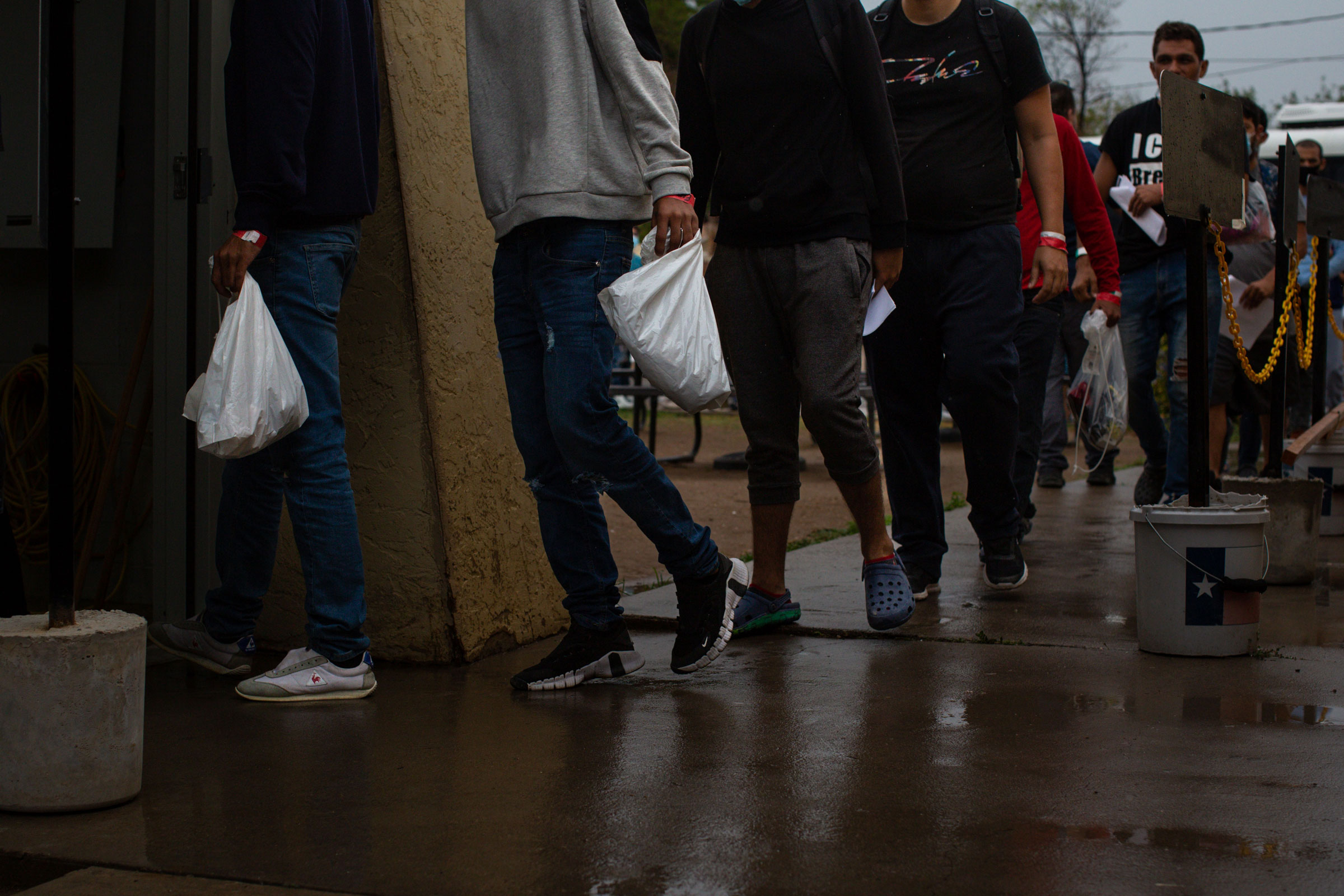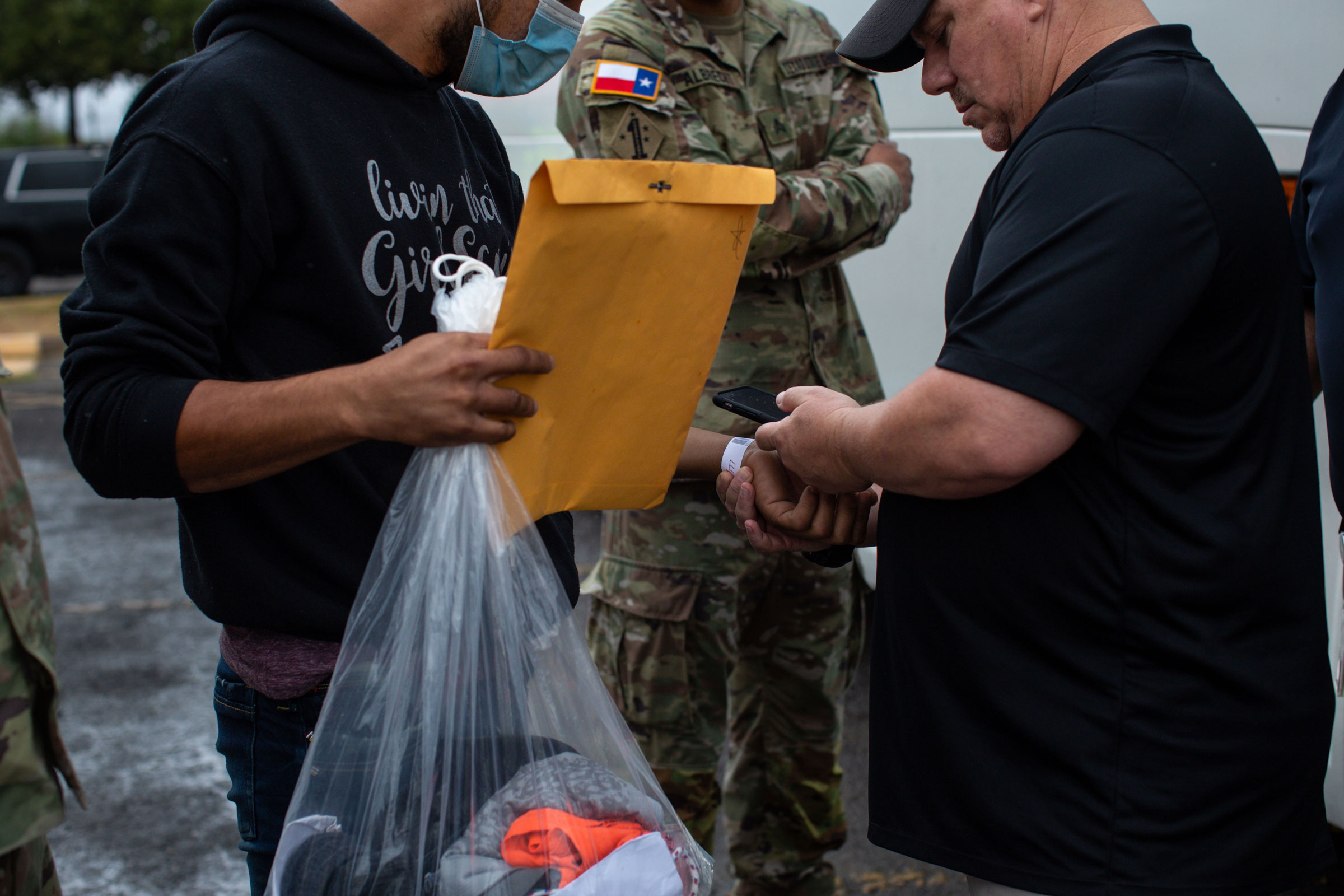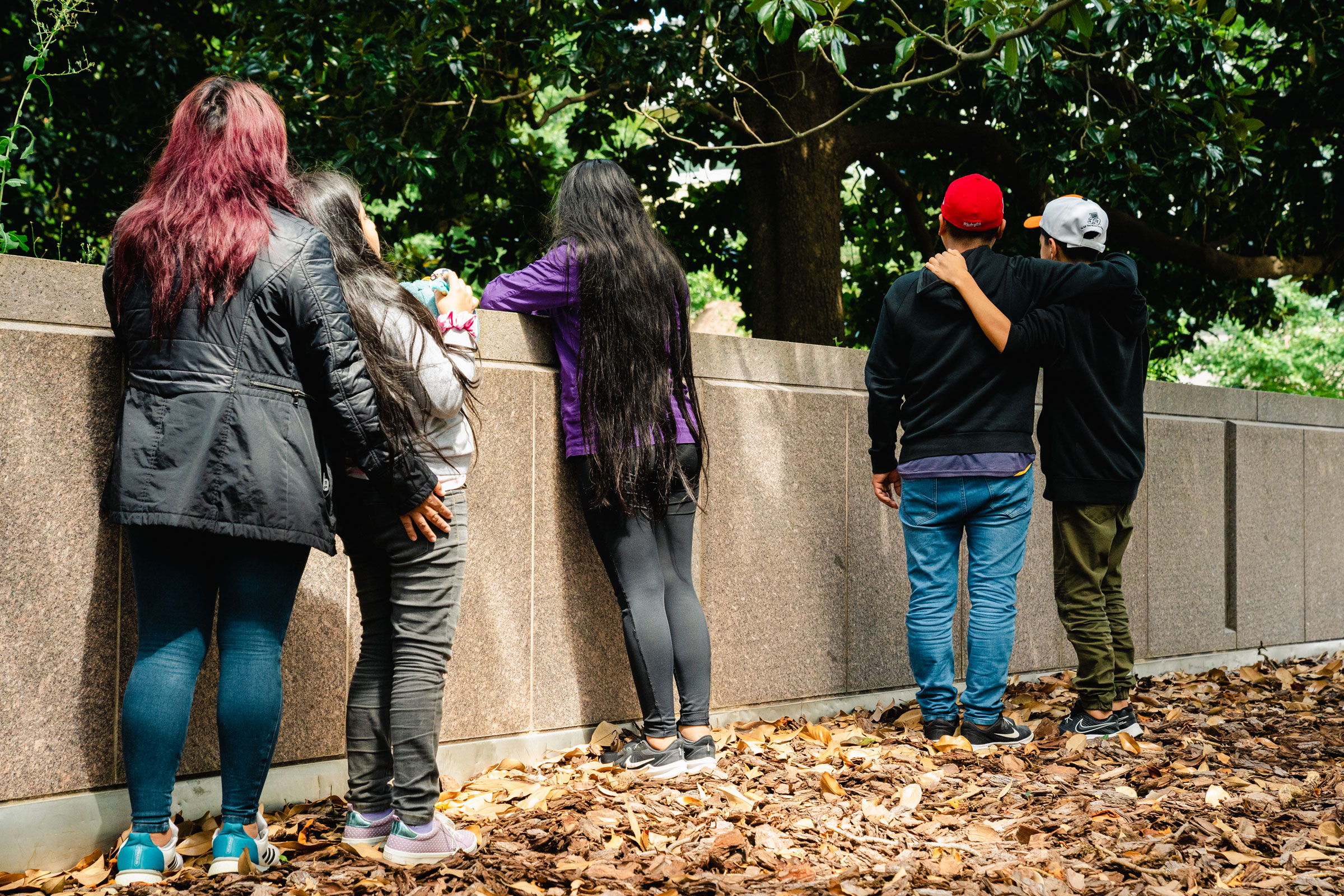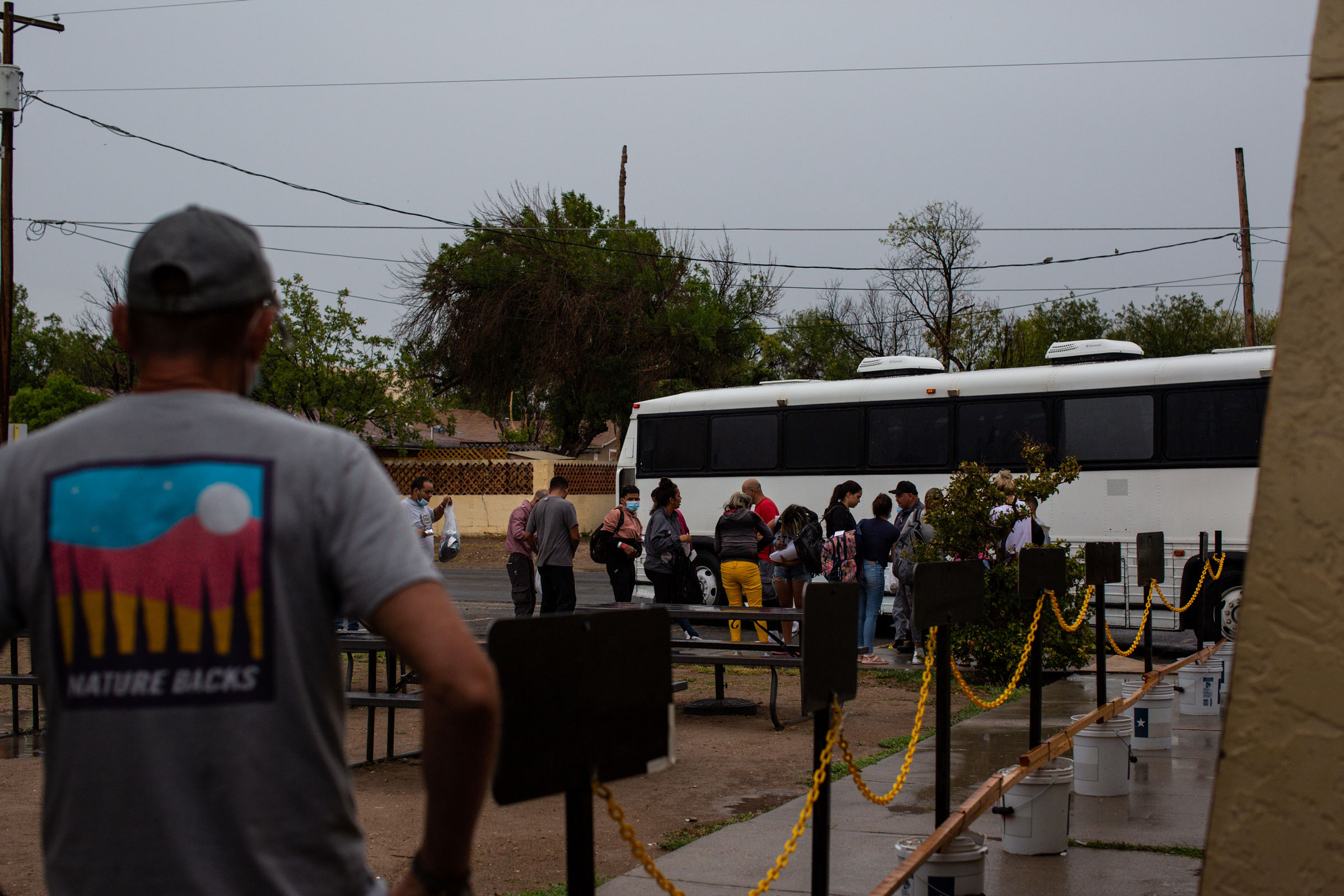The first group of migrants arrives in a white bus as the rain calms. On a soggy August morning in Del Rio, Texas, about 50 men, women, and children have just been released from U.S. Customs and Border Protection (CBP) custody. Despite deboarding into a rare desert downpour, most of them are smiling.
After weeks of traveling from their home countries of Venezuela, Cuba, Colombia, and Honduras, these migrants are now permitted to be on U.S. soil free from government detention. The next leg of their journey awaits. For many, it will mean stepping onto yet another bus— and into a national political debate over which American communities host them.
Since April, Texas Governor Greg Abbott, a Republican, has been chartering buses to send migrants crossing the border from Del Rio and nearby Eagle Pass to cities like Washington, D.C., New York City, and Chicago. It’s a political salvo to Democratic leaders: liberal “open border” policies, Abbott says, are overwhelming Texas, and he wants to give them a taste of what Texas communities are going through by shuttling migrants to their cities instead.
More than 7,700 migrants have been dropped off in Washington on more than 185 buses since April, according to Abbott’s office, and more than 2,100 people have been sent to New York City. Those cities’ Democratic mayors have struggled to respond to the flow of migrants who may not be able to secure their own housing, health care, or transportation. D.C. Mayor Muriel Bowser has twice requested help from the National Guard to support the arrivals, blaming Abbott for using “desperate people to score political points.” New York City Mayor Eric Adams called busing “horrific” and accused Texas officials of forcing migrants onto buses.
The busing—part of Abbott’s Operation Lone Star, a controversial initiative to secure the Texas-Mexico border that launched in March 2021— has cost Texas taxpayers more than $12 million as of mid-August, according to the Texas Division of Emergency Management, while Abbott has raised more than $303,000 in private donations to fund the effort. But for the migrants who choose to board them, the buses are free. And for many of the travelers, the transportation has been a welcome gift beneath the political gamesmanship.

Fifteen migrants who spoke to TIME in Del Rio and Washington said they were thrilled for the option of free transportation, and were surprised to learn that Abbott’s intentions were less about accommodating them than inconveniencing his political opponents. “It’s great that he helped us,” says Oliver, a 26-year-old migrant, in an interview conducted at his arrival in Washington on July 26. Oliver, whose surname TIME is withholding because he fears for his family’s safety in Venezuela, knew the bus was organized by Abbott, but he didn’t know why, nor did he understand the political overtones.
Other states are beginning to follow Abbott’s lead. Arizona started a version of the busing scheme, sending more than 1,600 migrants to Washington since May in 45 buses that cost roughly $83,000 apiece, according to C.J. Karamargin, communications director for Arizona Governor Doug Ducey, a Republican. El Paso, Texas, a city led by Democrats and historically considered welcoming of immigrants, has decided to charter its own buses independent of Abbott’s operation, to send migrants to New York City and Chicago. Florida officials have also flirted with the idea.
More from TIME
Never before have state governors taken it upon themselves to bus migrants, and the move means they’ve inserted themselves in immigration processing that is typically handled by the federal government. Meanwhile, Congress has failed to act on significant immigration measures, and the population attempting to cross the border has shifted from primarily single adult Mexican men who the government can quickly return to Mexico, to families from countries they can’t be easily returned to.
If the states intended to sway the federal government to toughen immigration policy, they so far have been unsuccessful. But in the process, they’ve provided a service to thousands of migrants seeking homes in the United States.
‘I consider them the U.S.’ responsibility’
The Val Verde Border Humanitarian Coalition (VVBHC), a local nonprofit, is ready to receive the migrants in Del Rio on Aug. 15 when the CBP bus arrives at their headquarters.
VVBHC is the only organization in the county working with CBP and the Texas National Guard to help process migrants to board Operation Lone Star buses. Tiffany Burrow, VVBCH’s director of operations, ushers the migrants inside one of the buildings to receive an orientation about their two options: either pay for travel arrangements themselves, or take one of Abbott’s free buses bound for New York City later that day.
Most migrants who cross the border don’t have much cash on hand and never intended to stay in Del Rio. Many are trying to reunite with family or friends in other parts of the country. When orientation is over, the migrants come back outside into the rain, each carrying a yellow folder with the name of their destination handwritten over the top—Chicago, New Jersey, Miami, Washington D.C. More than half of the 273 people who arrived that day decided to take the Operation Lone Star Bus.




Those who have opted to take the bus are quickly ushered into a building manned by the Texas National Guard. “As soon as they step foot in the U.S., I consider them the U.S.’s responsibility,” says one of the Guardsmen, who spoke under condition of anonymity because he isn’t authorized to speak to the media. It isn’t political to him, he says, but rather about helping people on American soil.
The crush at the border is increasing. In 2021, VVBHC assisted about 23,300 people who had crossed the U.S.-Mexico border. Between January and August of this year, that figure neared 32,000. In August alone, 4,500 people were processed through VVBHC.
When VVBHC was founded in 2019, the protocols were different. CBP would either release migrants to local churches or at drop-off points, where they would be on their own to figure out their next steps. The organization was formed as a stopgap to aid migrants and keep the community from being inundated with people unsure of where to go, says Burrow. “When I hear that Washington D.C. is overwhelmed with people, I’m not sure they really realize what they’re saying,” she says. “They haven’t been to the border. They are not seeing what my eyes are seeing here.”
While the migrants wait for their charter bus to arrive, many make use of VVBHC’s portable showers. It’ll be their last chance to wash before the two-night journey to New York City. After five minutes, a Guardsman in a camo-pattern rain poncho knocks on their door, rushing them out. “Buena suerte,” he tells them: “Good luck.”
‘Thank God they’re helping us’
The first Operation Lone Star bus of the day arrives at VVBHC around noon. Before boarding, each of the migrants is fitted with a white wristband imprinted with a barcode—a way for Texas to monitor people who use the program. As the travelers board the bus, an official scans their bands and checks their bags, and Burrow hands out sweatshirts for the air-conditioned ride. The bus’s 52 seats fill up quickly. A dog sniffs for drugs, and then it takes off. Even through the tinted windows, it’s easy to see hands waving goodbye.
For the next two days and nights, 27-year-old Jhason from Venezuela sleeps upright. He and the other passengers are fed pink packages of food resembling military MRE’s. “HUMANITARIAN DAILY RATION,” the wrapping reads in all capital letters. Beneath the image of an American flag it says: “Food Gift From the People of the UNITED STATES OF AMERICA.”

“The food isn’t that good, but thank God they’re helping us with this,” Jhason, who is being identified only by his first name because he fears for the safety of his family in Venezuela, tells TIME in Spanish via WhatsApp from aboard the bus. Jhason says he traveled through seven countries over 43 days to get to the U.S.-Mexico border. He has no family or friends in the U.S., but he decides to hop off the bus in Washington because it sounds like a good place to find work, and because he’s looking forward to a cold winter.
The passengers on the bus share the same objective, according to Jhason: “To be safe and well emotionally, physically, and psychologically, and even financially.”
On Aug. 26, a different bus carrying migrant families arrives at a local Catholic church in Washington D.C. after a two-night trip from Yuma, Ariz. The travelers are met by volunteers who help the migrants plan travel to their final destinations, and give them food, clothes, and the option to shower.
Jennifer and Jimmy are traveling with their three children, ages 16, 13, and 9. They are trying to get to Boston where they have cousins. The family fled Peru in July when Jennifer started receiving threats from a local gang member. Jennifer, who is being identified only by her first name because she fears retaliation, shows TIME a recording she took on her phone of the gang member threatening to kill his wife, who is one of Jennifer’s friends. When the gang member found out about the recording, Jennifer says, he started threatening her for collecting evidence of his behavior.
After that frightening ordeal, a safe, free bus that would take her family closer Boston was a “blessing,” she says while her youngest child plays with a stuffed animal gifted to her by the church. And the food wasn’t too bad: “We ate hamburgers every day,” she says with a laugh. Tatiana Laborde, managing director of SAMU First Response, the international nonprofit leading the Washington operation, says migrants on the buses from Arizona often have more amenities than those arriving from Texas— better food than Jhason’s rations, for example, and paramedics onboard. “Texas is Texas,” Laborde says.
A complicated political environment
All these migrants have entered a political debate over immigration policy in the U.S. which has only intensified in the weeks leading up to the midterm elections. Politicians on the right have cast people like Jennifer, Jhason, and Oliver as part of an “invasion” at the Southern border. While the left signals a more welcoming posture, many Democratic politicians, particularly in border states, are leery of being attacked for lax immigration enforcement. And the leaders of the liberal cities receiving Operation Lone Star buses have struggled to keep up with the influx.
On Sept. 8, Washington Mayor Bowser declared a public emergency in response to the busing. In New York City, Mayor Adams has said local homeless shelters have been overwhelmed with migrants (a claim local immigrant advocates deny is true). Abbott’s latest busing destination is Chicago, a move Mayor Lori Lightfoot called “racist” during a press conference.

So far, busing has not led to policy changes, and only a small number of people compared to the total number allowed to cross the border have access to the program. But experts and the migrants themselves see potential benefits of the new system, regardless of the intent behind it. If done ethically, it can spread some of the strain of thousands of new arrivals away from over-stressed border towns, they say, and it can help individuals with few resources reunite with family or connections elsewhere in the U.S. “If it weren’t for the politics…then yes, [busing is] a solution,” says Theresa Cardinal Brown, managing director of immigration and cross-border policy at the Bipartisan Policy Center, a Washington think tank. “From a practical standpoint, if it’s helping migrants on their onward journey… and they understand what’s going on, and they don’t feel like they are being misused or maltreated in any way, then, okay.”
Yet the unprecedented nature of the operation means politicians, immigration experts, advocates, and migrants themselves are figuring it out as they go, with the travelers often left to make split-second decisions about their futures.
Amparo, a 29-year-old migrant from Peru, arrived in Washington on Aug. 26 from Yuma. She is being identified by her first name because she fears for the safety of her family back home; she shows TIME the fresh scar on her right temple, which she says she got after a police officer attacked her with a baton at a protest against the Peruvian president. She decided to head to the U.S., hoping to join a cousin in Atlanta. Once reaching Yuma, Amparo was given the option of paying for her own flight to Atlanta or taking a bus to Washington. Because her credit card was declined, she decided to take the bus.
“I had nowhere else to go,” Amparo says. But the bus was a boon: from Washington, a flight to Atlanta turns out to be more than $300 cheaper, she says. “Everyone here is so grateful.”
With reporting by Mariah Espada and Julia Zorthian/New York
More Must-Reads from TIME
- Cybersecurity Experts Are Sounding the Alarm on DOGE
- Meet the 2025 Women of the Year
- The Harsh Truth About Disability Inclusion
- Why Do More Young Adults Have Cancer?
- Colman Domingo Leads With Radical Love
- How to Get Better at Doing Things Alone
- Michelle Zauner Stares Down the Darkness
Write to Jasmine Aguilera/Del Rio, Texas at jasmine.aguilera@time.com
